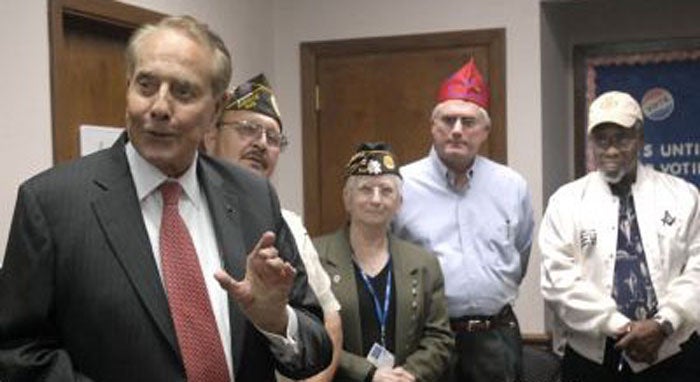David Shribman: Four men of stature and decency
Published 9:37 pm Saturday, August 4, 2018

- Bob Dole visits Salisbury in 2008 to campaign for his wife, Salisbury native Elizabeth Hanford Dole, who was a candidate for the Republican presidential nomination at the time.
KENNEBUNKPORT, Maine — The buses and bicyclists still linger at the Ocean Avenue wayside. They peer across Cape Arundel to Walker’s Point, listening to the surf, feeling the spray, perhaps wondering if the way the sun plays off the rushing water, the twinkles seeming like a thousand points of light, might have prompted one of the most powerful metaphors of the George H.W. Bush presidency.
Bush, whose 1988 Republican presidential nomination acceptance speech imagining “a better America … an enduring dream and a thousand points of light” spawned his nonprofit voluteerism organization, is back here at his summer retreat. He is 94, the oldest former president in history. In Georgia is one of his predecessors, Jimmy Carter, himself two months shy of 94. In Minnesota is Walter F. Mondale, Carter’s vice president and Bush’s predecessor in the post. He is 90. And in Washington is Bob Dole, like Mondale an unsuccessful presidential nominee. He turned 95 last month.
Never before has the United States — a lucky nation by any measure, especially endowed by this measure — ever had so many former statesmen at such an advanced age.
These four men in their 90s —two Republicans, two Democrats — account for 10 national campaigns, two presidencies, three terms as vice president, one as governor, seven Senate terms, six House terms, two stints as Republican National Committee chairman and three ambassadorships. One is a presidential and double-gubernatorial father, another a Cabinet spouse. They all have had remarkable wives, independent-minded and sharp-tongued, spokeswomen for literacy, the arts, mental health, and automobile and worker safety.
When they began their work, the Cold War was in a deep chill following the downing over the Soviet Union of the U-2 reconnaissance flight of Francis Gary Powers. Bush presided over the end of the Cold War and the dissolution of the Soviet Union.
“We’ve all lived a long time, and that’s unusual for the country,” Dole, who had three dozen years on Capitol Hill, told me just before his birthday. “I think age brings wisdom, and if you give advice, sometimes people take it.”
The four seldom give much advice anymore — they feel they had their time in the arena, and now it is others’ turns — but they stand as examples, partisan pugilists, to be sure, but exemplars of public service. Dole, for example, ran for president against Bush in 1980 and 1988, and in the latter campaign complained bitterly Bush had distorted his record. The two now exchange birthday greetings.
“Dole and I were in the Senate together,” Mondale recalled in a conversation the other day. “There was heated rhetoric, but in those times, we kept the idea of comity in mind. We don’t have that anymore. Honest to God, I don’t know what we have now. I’m quite worried about that.”
A grace note that makes the point: When Bill Clinton nominated Mondale as U.S. ambassador to Japan, Dole took up his cause in the Senate. “There was no hard feelings,” Dole said. “We were friends.”
The two nonagenarian presidents both served single terms but grew in the estimation of Americans as their White House years receded. Bush is an enduring symbol of American grace, and there have been more than 6,300 “points of light” citations, coveted salutes across the country. Here in Kennebunkport a ship’s anchor rests on the side of the road, an homage to Bush as an “anchor to windward,” a tribute placed “by those who love him as much as he loves this special place.” This summer a white seashell quietly appeared in a bed of flowers aptly named “Barbie’s bouquets.” Hand painted on the shell: Mrs. Bush, always in our heart.
Carter might have edged out Herbert Hoover, another one-term chief executive, as the best former president in American history. The 39th president endured the lowest approval ratings ever recorded, but the best assessment of Carter’s life may have come from University of Georgia sociologist Kenneth Morris, who wrote in 1996 that “the ‘half-life’ of his reputation is astonishing, but it is by no means clear what this reputation consists of or where it will rest.” Indeed, Carter may be better remembered for the Habitat for Humanity houses he built than for any White House record he built.
Americans, who traditionally have short memories, should admire these men with long lives. In these four careers are great lessons for those of us who share the air they breathe in the nation they served.
One of those lessons is integrity (Carter’s vow never to lie to the American people).
One of them is courage (Bush’s willingness to accept a tax increase after his read-my-lips vow of “no new taxes,” a reversal of policy that cost him the support of many in his own party).
One of them is grit (Dole’s recovery from debilitating war injuries and his later role as champion of the Americans With Disabilities Act).
One of them is dignity (Mondale’s shining example after losing 49 states in the 1984 election and his gentle nobility in the years that followed).
Today politicians of the old school and the old days are ridiculed, their sense of fair play dismissed, their willingness to act in a bipartisan way cited as examples of a corrupt insider political culture. Once, these men fought fiercely, but those fights now are over. “They’re all friends of mine, and I’m glad we’re all around,” Mondale said. “I’d like to add a few more years for all of us.” A few more years— and a few more political figures like them.
David M. Shribman is executive editor of the Post-Gazette (dshribman@post-gazette.com, 412 263-1890). Follow him on Twitter at ShribmanPG.

